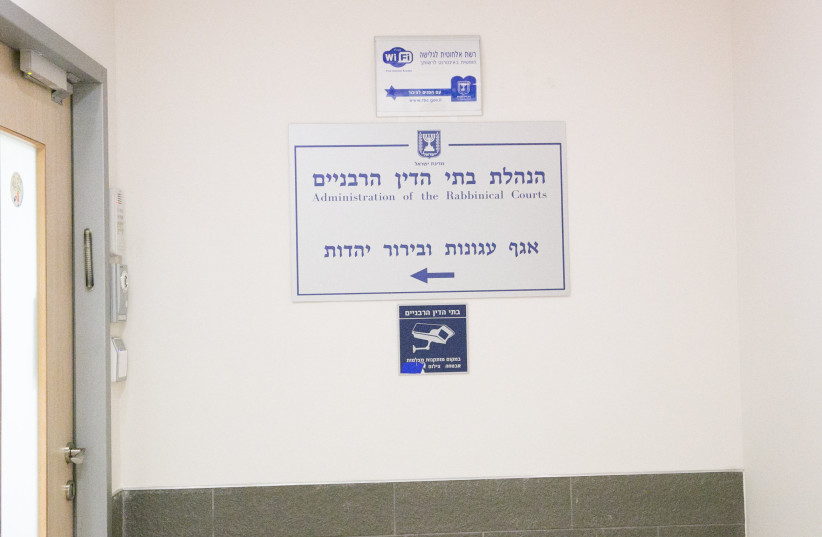The rabbinical courts in Israel published data about their operations concerning agunot and get refusers as Israelis marked Aguna Day on Wednesday.
An aguna is a woman whose husband cannot be found, while get refusal is a situation where either the man refuses to give a get - a document which must be given by the husband to the wife in order to effectuate a divorce - or the woman refuses to accept it.
The rabbinical courts' aguna department works in a number of ways to locate the affected women's husbands, including hiring private investigators in Israel and around the world and sending department employees abroad to locate and convince the absent husbands to grant a divorce. The department coordinates with the Israel Prison Service, police, border control, Foreign Ministry, embassies and additional authorities in Israel and abroad.
In 2021, the rabbinical courts managed to arrange a divorce from 134 husbands in the former USSR, Europe, North America, South America, Africa and Asia. Last year, the aguna department invested more than NIS 200,000 just to hire private investigators.
In the aguna department, 59 cases have been open for up to a year, 36 cases have been open for one to three years, 24 for three to five years, 16 for five to seven years and 14 have been open seven years or more.

Concerning get refusers, the rabbinical courts have a variety of tools they use, including a number of different sanctions, in order to convince the refuser to give or accept the get. Some 274 sanctions were issued by rabbinical courts in 2021, 40 more than the year before. A bill is being presented to the government soon which would allow more severe sanctions against get refusers.
Seven of the cases in 2021 had been open for more than seven years. Two had been open for three to five years, five for three years, four for two years, 25 for a year and six cases had been open for 45 days.
Some 589 rulings were issued by rabbinical courts concerning divorce last year and another 51 were to issue a get where the husband refused.
A third category of cases, "continuing divorce," includes those where a get has not been issued for over two years. Of all the divorce cases opened each year, only a third of a percent of them fall into this category.
Aguna Day is marked on Taanit Esther (The Fast of Esther) each year on the day before Purim. The director of the rabbinical courts, Rabbi David Malka, pointed out that on Purim, worshippers read a passage of Psalms which includes a verse reading "My God, my God, why have You abandoned me; why so far from delivering me and from my anguished roaring?"
"It may be that this is the feeling of every woman who is an aguna or being refused a get," he said: "that she has been abandoned to her bitter fate and turns to the Creator of the World in calling 'my God, my God, why have You abandoned me and from where will my salvation come?"
"The rabbis of the rabbinical courts are making great efforts to free women from their aguna status and to help those who are refused a divorce, as the rabbis and judges of Israel have done in all generations," said the director of the rabbinical courts.
"The judges of the courts make use of the issuance of restraining orders when necessary, in accordance with Jewish law and secular law, while exercising judicial discretion as to the means that will bring the desired result in any given case," Malka said. "The data show that the fight against the phenomenon is bearing fruit."
"These days we are promoting very important legislative amendments to tighten the sanctions against those who refuse to divorce, through a bill that has been approved by the government and is currently in legislative proceedings," he said.
"The bill expands the restraining orders that can be applied against those who refuse to divorce and thus the rabbinical courts will have additional tools that will help in the fight to eradicate the phenomenon of aguna and refusing to divorce."
